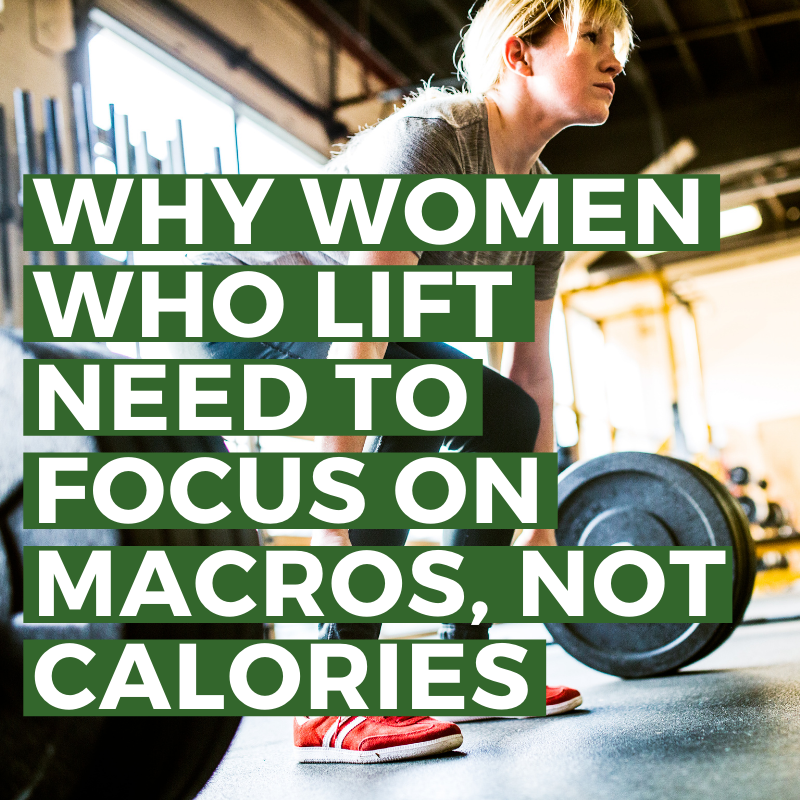So, I heard you’re lifting a lot and you’re probably hoping for a couple things to happen:
- To improve your overall health
- To develop strong, lean muscle
- To look a-maz-ing in jeans (if we’re being honest)
But, if you’re only tracking calories—or not tracking your food at all—you might be missing out on major results in all three of those areas. Not to mention, you’re probably feeling a bit deprived when you could eat more and get lean instead!
Here is why macro tracking is better for strength-training fans than calorie counting…
Calories influence weight, macros influence body composition
Calories could change your scale weight, but macros could change your body shape. In other words: You can hack the way you eat to lose fat with macros, not just water weight.
This is because calories are king for determining changes to your weight, and macros are king for determining changes to body composition. As an active, strength-training woman, your needs are different (and higher) than your bff who prefers to spend her after work hours lounging on the couch catching up on Netflix.
When you only consider the calorie count in food, you are failing to look at what else that food offers—specifically the macronutrients: proteins, carbs and fats. Especially for my ladies who lift, protein is an essential building block for the muscle + progress you hope to see.
If calories are “splatter paint,” macros are “paint by numbers”
Do you want a generic meal plan OR do you want a way of eating that is highly personalized?
Yes, calorie counting can get you part of the way—just like splatter paint effectively colors a canvas. But if you want accurate, better results, you really need the strategic approach that macro-tracking offers. Because macro-tracking involves a tailored balance of protein, fat and carbohydrates, you will have the tools to create a nutrition plan that works for you today years from now.
Counting calories doesn’t guarantee you eat enough to build muscle, but tracking macros can
You might already know that calories matter for weight loss and weight gain. But what does that weight loss and gain mean? Is it muscle or fat gains or losses? Unfortunately, you can’t plan or predict if you’re just counting calories. But using macros for weight loss allows you to target the right kind.
Let’s say you need 1850 calories to support your metabolism, hormones, and strength training activity.
Your day could look like this:
- Cereal, fat free yogurt
- Ramen bowl
- Wendy’s cobb salad and a small soft service ice cream
Does this sound like the diet of someone who is making great strides in their fitness?
Your day could instead look like this:
- Protein-rich smoothie
- Fully loaded salad with grilled chicken, avocado, black beans and cheese
- Greek yogurt bowl with blueberries and granola
- Ground turkey stir-fry with all the veggies
Something like this would better suit your needs as a strength training woman! By ensuring that you’re eating enough of each macro from quality foods, you’re effectively giving directions to your body to build and maintain lean, strong muscle, while burning body fat for fuel when you’re in a slight calorie deficit.
Exercise makes you hungry—and macro-tracking lets you better understand those cues
“Mmmm, I am so glad I have these gummy bears to keep hunger at bay!” – said no one ever.
Ever notice how some foods make you feel more full and satiated for far longer than do others? That’s because not all calories are created equal.
It takes longer to digest and absorb the nutrients from protein and fat containing foods like eggs, meat, and nuts than to digest carbohydrates. So by emphasizing protein- and fat-rich foods over carbohydrate-rich foods (bread, pasta, fruit) when you’re hungry, you’ll feel fuller longer from the same amount of calories.
If you’re only counting calories, you risk feeling hungrier and less satiated as your strength training ramps up in the gym.
Macros can lead to better recovery, calories might not
Ever felt like you lacked that “go switch” in your workout? Your nutrition might be to blame!
You certainly don’t want nutrition to stand in your way of making strength and lean muscle gains—but it could if you’re undereating important nutrients. Tracking macros ensures that you’re eating enough food, and specifically enough protein and carbohydrates, to recover appropriately from your challenging workouts.

